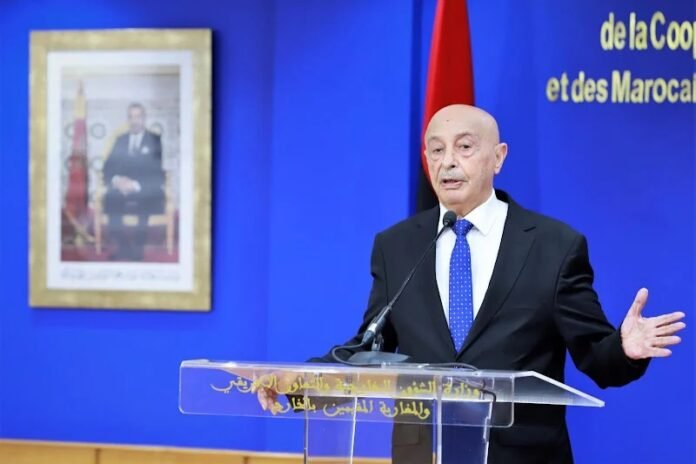In a recent televised interview, Aguila Saleh, the Speaker of the Libyan House of Representatives, revealed that the parliament has not abandoned the Skhirat Political Agreement. However, he emphasized that both Mohamed Takala, the former President of the High Council of State, and Mohamed al-Menfi, the President of the Presidential Council, refused to meet with him twice—once at the Arab League and once in Morocco. This refusal to engage raises significant questions: Why are these leaders avoiding dialogue at critical moments when Libya is teetering on the edge of further instability?
Is the Skhirat Agreement Still Relevant in Libya’s Political Landscape?
Saleh, who recently led the charge to withdraw confidence from the Government of National Unity headed by Abdul Hamid Dbeibah, as well as from the Presidential Council, stressed that the Skhirat Agreement does not stipulate the involvement of the High Council of State in budget preparations. This assertion contradicts accusations against him of breaching the Skhirat Agreement, which mandates consultation between the House of Representatives and the High Council of State. Here, the critical question is: Is Saleh’s interpretation of the agreement accurate, or is it a strategic move to consolidate power amidst Libya’s fractured political environment?
The Political Scene in Libya: A Brewing Conflict
Libya’s political scene has been marked by escalating tensions and mutual accusations of violating the terms of the dialogue agreements. The conflict over the leadership of the High Council of State between Mohamed Takala and Khaled al-Mishri, coupled with the House of Representatives’ withdrawal of confidence from Dbeibah’s government and the army’s break from the Presidential Council, has deepened the crisis. What are the underlying motivations behind these moves, and how do they impact Libya’s path towards stability?
The Role of the Central Bank and the Accusations of Corruption
The situation was further complicated by the decision of the Presidential Council led by Mohamed al-Menfi to dismiss Saddek Elkaber, the Governor of the Central Bank of Libya, and appoint Mohamed al-Shukri as his successor. Saleh condemned this move, describing it as an attempt to “plunder public funds and perpetuate corruption.” He questioned the legitimacy of the Presidential Council’s intervention in sovereign positions, particularly in managing Libya’s wealth. Should the control of national wealth be centralized to prevent misuse, or does this centralization risk further entrenching corruption?
Potential Mediation and Morocco’s Role as a Neutral Ground
As the political deadlock intensifies, Libya is at a crossroads where international mediation might be necessary to find a resolution. Idris Ahmed, a Libyan political analyst and expert on Maghreb affairs, highlighted Morocco’s potential as a powerful mediator, given its longstanding role in facilitating Libyan dialogue, including hosting the Skhirat Agreement talks. Can Morocco leverage its neutral position and historical involvement to break the current deadlock, or will the internal divisions within Libya’s political entities prevent meaningful progress?
Libya’s Military Movements: A Source of Regional Tension?
The Libyan National Army, led by General Khalifa Haftar, has been active near the Algerian border, raising concerns about the influence of foreign actors in the ongoing crisis. Ahmed pointed out that the army’s movements are crucial for securing Libya’s borders, which are crucial for counterterrorism and combating smuggling networks. However, this raises another question: How will neighboring countries, particularly Algeria, respond to these military maneuvers, and what impact might this have on regional stability?
Conclusion: Navigating Libya’s Political Turbulence
As Libya faces a series of complex challenges, including a fragmented political landscape and competing military interests, the question remains whether internal or external mediation can resolve the crisis. With the Skhirat Agreement hanging in the balance and various factions vying for control, the future of Libya’s political stability is uncertain. Will the country find a path forward through dialogue, or is it headed towards further division and conflict?


